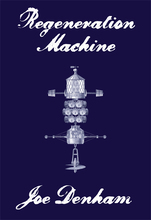Review by Amber McMillan
Regeneration Machine
Joe Denham
Nightwood Editions, 2015
Joe Denham is a fisherman and carpenter living on British Columbia’s Sunshine Coast, and Regeneration Machine is his third book of poetry. Denham is not a poet churning out books every year or two—these are books that take time, and it shows. Regeneration Machine is a 100-stanza elegy-letter to his friend Nevin Sample, a young man who inexplicably held up a credit union, fled the police, and then shot himself.
Instead of tackling the question of why, Denham tries a new angle: he talks to his friend, 20 years later, about the parts of life Sample has missed, about marriage, work and children. Denham offers these affections, to us and to Sample, as examples of why life turns out to be better than death, stubbornly insisting that carrying-on is worth it, promising that despair becomes wonder again, then gratitude. Denham uses the things he’s learned—and in perhaps one of the most moving sentiments—explains to his dead friend the details of what he now has against what his friend has forgone, not least of all, to know a life, to have been loved, as he puts it, “Of Being Adult In the New and In EveryWhichWay Sweetfucked Millennium”: (17)
And that’s what you’re missing, old friend. It’s that simple.
Sure, we’re deluded and distasteful in our hubris and entitlement,
but the love of a good woman, and children, and a home
raised with one’s own hands. I can tell you beauty is a constant,
like pi, and light (31)
Denham adds social/political confoundment and ruminates on certainty and fear—in the Socratic sense, posing rather than telling—and wrestles the problem of making meaning out of randomness by narrowing the scope to dissect practical problems of living each day, as we do, with the threat of our own death. In these ways, Regeneration Machine advances many of the problems and themes of his second collection, Windstorm (2009), and contains much of what we’ve come to expect from him as a poet—unblinking examinations of grief, regret and vulnerability—and perhaps most of all, with no cards up his sleeve, a referential, pragmatic language that speaks directly to his subject. On the other side of love, Denham writes:
Fukishima’s melting cores breached
containment; there’s cesium-137 in the rain and therefore the
lettuce, milk, fish; I don’t know what I’ll say when they ask us
two decades from now why we didn’t at least pull stakes and run
(39)
And earlier from Windstorm:
the sickly water
I feed my son and daughter worsening daily as does
all that’s left of this world with which they must learn
now to make do (sadness, through and through) adrift
as they are, as we are, without bearing, without ballast
(66)
There are several important repetitions in Denham’s work, but one that struck me in this book in particular is the image of a child holding a fish out of water; brought to bear is the annihilation of what is good, the naïveté of an unwitting villain, and the kind of killing that begins from love. Poet Lyn Hejinian once wrote, “however pleasurable its effects, closure is a fiction, one of the amenities that falsehood and fantasy provide,” and Regeneration Machine seems to stare that truth in the face. Denham is a fierce talent, among the countries finest lyric poets, and he’s only getting better. Continuing to take apart plaguing themes of earlier work, Regeneration Machine is a sane and sober love letter that after twenty years finally says goodbye to a friend. It’s burning Nevin Sample’s fishing boat and setting it out to sea.
Amber McMillan is the author of We Can’t Ever Do This Again (Wolsak & Wynn, 2015). Her poems have appeared in Arc, Contemporary Verse 2, and subTerrain among other journals across North America.